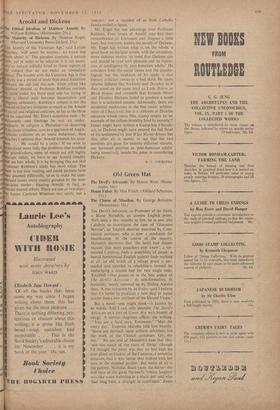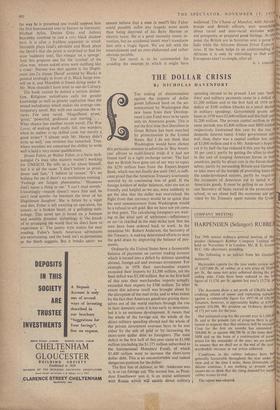Old Green Hat
The Charm of Mambas. By George Brendon. (Heinemann, 16s.) 'FIIL Devil's Advocate, or Promoter of the Faith. is Blaise Meredith, an austere English priest. With only a few months to live, he is sent into Calabria to investigate the case of 'Giacomo Nerone', an English deserter executed by Com- munist partisans, who is now a candidate for beatification. In the course of the inquiry, Meredith discovers that 'the heart had deeper reasons that most preachers ever knew'; a tor- mented Contessa finds a possibility of peace; a horrid homosexual English painter finds nothing at all; an old wreck of a village priest is per- suaded and enabled to rehabilitate himself by exchanging a double bed for two single ones. 'Enabled'—that points us to the best aspect of The Devil's Advocate ; its anti-formalism, its humanity, neatly summed up by Bishop Aurelio thus, 'A tree is,known by its fruits—and I believe that it's better to proclaim a new deal in social justice than a new attribute of the Blessed Virgin.'
But a novel—one might think—is known by its words. And I can only describe The Devil's Advocate as a sort of Green Hat with benefit of clergy. A similar staginess afflicts the writing. '"You are a hard man, Eminence." "Men die every day," Eugenio Marotta told him bluntly. "Some are damned. some achieve salvation; but the work of the Church continues. Go, my son." ' We are told of Meredith's eyes that they 'saw too much of the tears of things' (though I'd thought the point was that he had kept his eyes g(ued on books); of the Contessa, a novelette creation,,that it was 'terror that walked with her now in the dappled garden. But worst of all is the painter, Nicholas Black (note the name—the had twin of the good Nerone?), 'whose laughter was like water bubbling in a black pot' and who 'had long been a stranger to innocence.' From
the way he is presented one would suppose him the first homosexual ever to feature in literature; Michael Arlen, Dorian Gray and Aubrey Beardsley combine to cast a very black shadow here. It is after a fruitless argument in which Meredith plays God's advocate and Black plays the Devil's that the priest is surprised to find his wine 'suddenly sour, like vinegar on a sponge.' And this prepares one for the 'symbol' of the olive tree, 'whose naked arms were outflung like a cross': Nerone was shot against it, his illegiti- mate son Ca classic David' coveted by Black) is painted invitingly in front of it, Black hangs him- self on it, and Meredith is found dying under it. Mr. West shouldn't have tried to out-do Calvary.
The book cannot be denied a certain distinc- tion. Religious melodrama calls for greater knowledge as well as greater aspiration than the sexual melodrama which makes the average con- temporary novel. But with one exception the re- views I've seen raved. 'Magnificent prose,' `great,"powerful, profound and moving.' . . . What chance has another recent novel, The War Lover, of making itself really felt, one wonders, when its author is no skilled cook but merely a good writer? 'I almost wish Mr. Hersey didn't write so well,' one reviewer has remarked. True, where novelists are concerned the ability to write well is held a very minor qualification.
Homo Faber, or Walter Faber, is a Swiss tech- nologist Ca man who masters matter') working for UNESCO. He tells us a lot about himself, but it is all the same. 'I don't believe in provi- dence and fate,' I believe in, reason.' It's no holiday for me if there's no mechanism running.' 'Feelings are fatigue phenomena.' 'Museums don't mean a thing to me.' I can't read novels.' Unwittingly—reason doesn't warn him and he can't read novels—he becomes the lover of his illegitimate daughter. She is bitten by a viper and dies. Faber is left awaiting an operation, for cancer, or a broken heart, or a galloping tech- nology. This novel too is based on a humane and sensible premise: technology is 'the knack of 'so arranging the world that we don't have to experience it.' The jaunty style makes for easy reading; Faber's South American adventures are entertaining; and the book isn't as portentous as the blurb suggests. But it breaks apart: we
cannot believe that a man (a man?) like Faber could possibly suffer any tragedy more acute than being deprived of his Baby Hermes or electric razor. He is a good sinisterly comic in- vention, but an accidental incest won't transform him into a tragic figure. We are left with the entertainment and an over-elaborated and rather obvious parable.
The last novel is to be commended for avoiding the swamps in which it might have
wallowed. The Charm of Mambas, with African troops and British officers, says somethin about racial and inter-racial attitudes with. out pomposity or prepared good feelings. At one point the British are in hysterics over a game of .ludo while the Africans discuss Greal Expecta' lions. If the book helps to an understanding of Africans it is only by reminding us that even Europeans aren't so simple, after all.
D. J. ENRIGHT











































 Previous page
Previous page